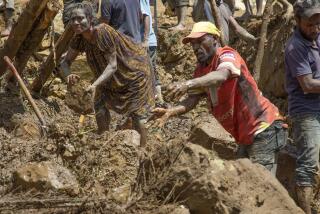Battles With Bows, Arrows and Spears : Tribal Strife Still a Way of Life in Papua New Guinea
PORT MORESBY, Papua New Guinea â Nelson Wale is 21 years old and already a veteran of many tribal battles in the rugged, mountainous Highlands of Papua New Guinea.
He proudly displays a deep scar on his forehead, one of the wounds suffered during battles with bows, arrows, spears and long knives.
Dark and muscular with piercing eyes, thick lips and a mop of black curly hair, Wale said he fled his native hill village for temporary shelter here after a violent tribal encounter at the end of last year.
At least five people died and several acres of food crops lay in waste after the fighting, which erupted because members of a neighboring tribe planted coffee on Waleâs family plot.
Clashes Part of Life
Wale just cannot understand why outsiders make a fuss over these clashes, which are a part of the life style in the Highlands where one-third of this Pacific island nationâs 3.3 million people live.
The undulating highland valleys, lying between towering cloud-shrouded mountains, boast Papua New Guineaâs most fertile soil and a mild, spring-like climate.
âWe fight. We settle. It is our way and we are happy. It always works,â Wale sail.
Papua New Guinea Prime Minister Paias Wingti views the continuing tribal strife with no great alarm either.
âA Dying Traditionâ
âIt is a dying tradition. You just canât go in and stop traditions. My government has no intention of making it a major issue,â Wingti, who ousted long-serving leader Michael Somare five months ago, said in an interview.
A bearded, soft-spoken 35-year-old bachelor, Wingti appears more like an intellectual than a member of his fierce Jiga tribe.
The Jigas were involved in the latest and most serious clash against a rival tribe earlier this year when a funeral procession in the Highlandsâ provincial capital of Mount Hagen broke up into bloody riots.
About 3,000 tribesmen, smeared with clay, fought along the streets of the mountain town using spears, arrows and stones.
Tear Gas Ended Mayhem
One person was killed, a large number were injured and several shops, banks and government offices were damaged before police used tear gas to end the mayhem.
About 80 people were arrested but only two were charged for rioting and sent to jail for four years. They were released on parole last month.
Wingti, who holds the parliamentary seat of Mount Hagen, brushed aside the violence as of little significance.
âItâs nothing much. They used only bows and arrows, no firearms. After the fighting they have gone back to normal life,â he said. âAll these traditions are dying down. They will fade away maybe in 10 to 15 years time. My interest is in the next generation.â
Government Control
In fact, large-scale tribal fighting in the Highlands almost disappeared after the former Australian administration brought warring tribes under government control in the 1930s when the outside world discovered the remote area through to the 1950s.
Many tribes resisted and attacked government patrols, but bows, arrows and spears were no match for rifles. Others spontaneously gave up warfare when Australian patrol officers first entered their lands.
But fighting broke out again in the 1970s in areas where population growth, brought about by the end of warfare and introduction of modern medicine, caused a spate of land disputes between neighboring tribes.
Even before Australia gave Papua New Guinea independence in 1975, fighting involving hundreds of warriors had become a serious problem in the more thickly populated parts of the Highlands.
By then the rifle fire used to suppress fighting in the early days of Highlands exploration was no longer politically acceptable.
Arrests Made Afterward
It is even less so for the new nationâs own government. Police now stay out of the battles and try to arrest fight leaders afterward.
Officials said, however, the Mount Hagen fighting was serious because it caused large-scale damage to a town. Usually tribal wars are confined to villages with destruction limited to homes, food gardens and livestock, they said.
In some urban areas gangs known as ârascalsâ--mainly unemployed villagers who have flocked into urban areas--have been committing murder, gang rape, robbery and other crimes.
The situation became so serious that the previous government declared a state of emergency and imposed an overnight curfew in the capital.
Curfew Lifted
Wingti, who sees the rascals as an extension of social discontent, has lifted the curfew and says his plans to increase economic growth and create new jobs will soon minimize the problem.
âIt is not worth talking about the rascals. They donât comprise even 1% of the population, but they take up so much publicity,â Wingti said.
âIf you go to the countryside, nobody talks about rascals. Only people in Port Moresby talk about it,â he added.
âWe cannot spend our limited resources in creating a big security network and turn the country into a police state.â
More to Read
Sign up for Essential California
The most important California stories and recommendations in your inbox every morning.
You may occasionally receive promotional content from the Los Angeles Times.










